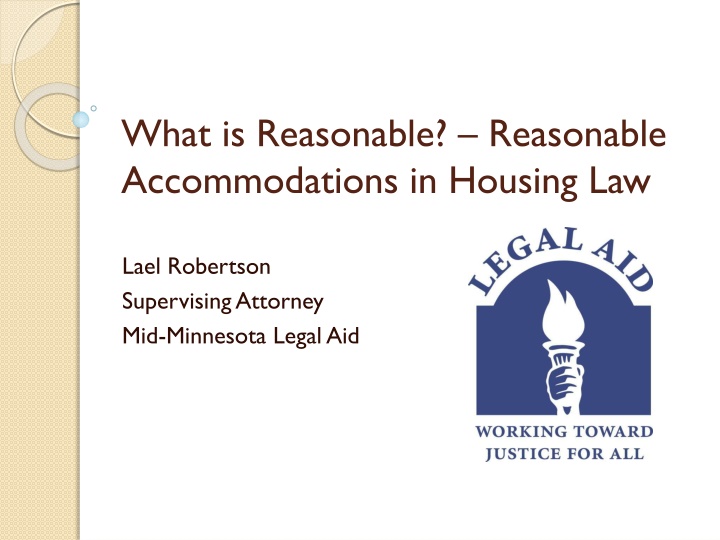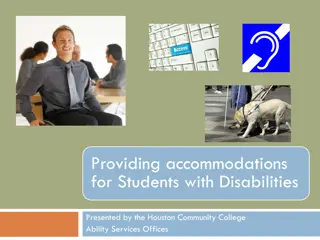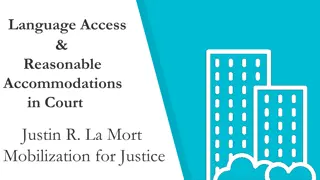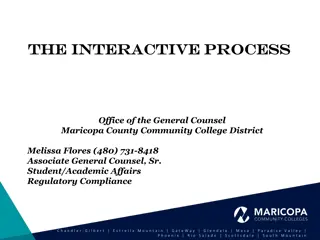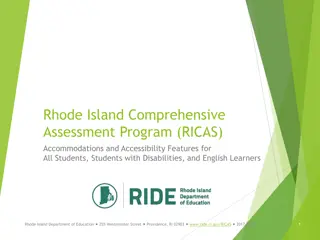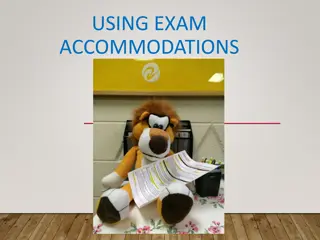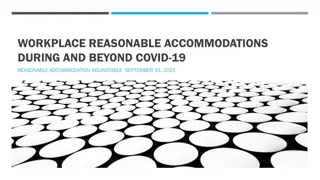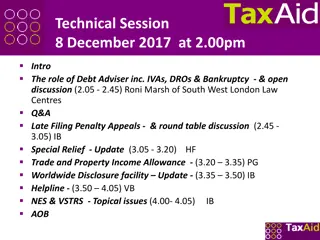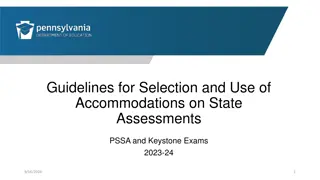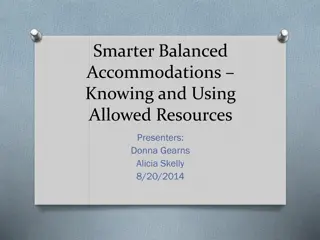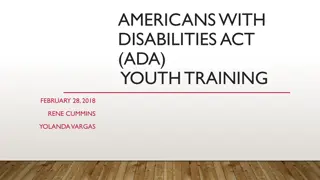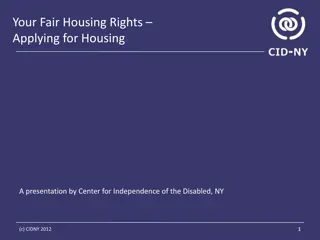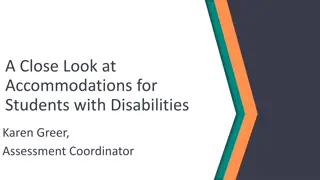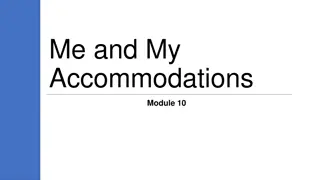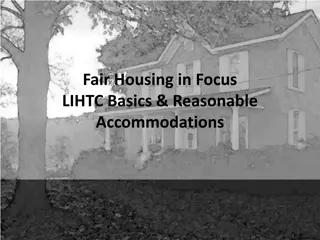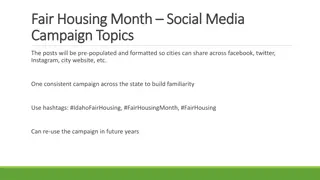Reasonable Accommodations in Housing Law
Exploring the concept of reasonable accommodations in housing law, particularly focusing on the rights of individuals with disabilities under various acts such as the ADA, MHRA, FHA, and more. Learn about the definition of disability, the importance of reasonable accommodations, and the implications of the Fair Housing Act.
Uploaded on Sep 09, 2024 | 1 Views
Download Presentation

Please find below an Image/Link to download the presentation.
The content on the website is provided AS IS for your information and personal use only. It may not be sold, licensed, or shared on other websites without obtaining consent from the author.If you encounter any issues during the download, it is possible that the publisher has removed the file from their server.
You are allowed to download the files provided on this website for personal or commercial use, subject to the condition that they are used lawfully. All files are the property of their respective owners.
The content on the website is provided AS IS for your information and personal use only. It may not be sold, licensed, or shared on other websites without obtaining consent from the author.
E N D
Presentation Transcript
What is Reasonable? Reasonable Accommodations in Housing Law Lael Robertson Supervising Attorney Mid-Minnesota Legal Aid
Mid-Minnesota Legal Aid Housing Discrimination Law Project Enforce low income clients fair housing rights Includes right to reasonable accommodations
Disability Laws Americans with Disabilities Act (ADA) Minnesota Human Rights Act (MHRA) Rehabilitation Act Fair Housing Act (FHA)
Disability Definition from ADA Individual must have a disability or have a relationship or association with an individual with a disability. Definition of Disability (42 U.S.C. 12102) A person who has a physical or mental impairment that substantially limits one or more major life activities. Major life activity include seeing, hearing, eating, sleeping, walking, standing, lifting, bending, speaking, breathing, learning, reading.
Definition, Contd Disability also includes: A person who has a history or record of such an impairment. A person who is perceived by others as having such an impairment. Note persons who are perceived to have a disability are not entitled to reasonable accommodations!
ADA Amendments of 2008 Intended to overturn case law that restricted the application of the ADA. Impairment does not need to prevent or severely or significantly restrict a major life activity to be considered substantially limiting. Mitigating measures (except glasses) have no bearing in determining disability An episodic impairment = disability if: when active, substantially limits a major life activity.
Fair Housing Act - 1968 Unlawful to take adverse action in housing based on protected class status.
Reasonable Accommodations - FHA Housing provider is required to make change in rules, policies, practices or services IF: Accommodation may be necessary to give disabled person equal use and enjoyment of dwelling AND The change is not unreasonable
Reasonable Accommodations 4 Step Analysis Must Have Disability Accommodation may be necessary for use and enjoyment of dwelling Accommodation is related to disability or disability- related need (nexus) Accommodation is reasonable
Unreasonable Requests Impose an undue financial or administrative burden; OR Require a fundamental alteration in the nature of the housing provider s operations
RA Examples At admission: Waiver of no pets policy (no deposit allowed!) Rent due on the 3rd instead of the 1st (for SSA payments) Section 8/Public Housing additional time to fill out paperwork During Tenancy: Parking Space At Termination: Second bite at the apple retract termination
Protected or Not Protected? Resident with a dog
Protected or Not Protected? Service Dogs
Protected or Not Protected? Animals for Emotional Support?
Specific Cases: Service Animals Allowing service animals is considered a reasonable modification Service Animal has a specific definition under the ADA Only dogs and miniature horses This is different than FHA! In 2010, DOJ published specific regulations regarding the use service animals. 28 C.F.R. 35.136; 28 C.F.R. 36.302(c)) Law is very specific in this area
Reasonable Accommodations 4 Step Analysis Must Have Disability Accommodation may be necessary for use and enjoyment of dwelling Accommodation is related to disability or disability- related need (nexus) Accommodation is reasonable
Protected or Not Protected? Resident with multiple dogs
Protected or Not Protected? Other Animals?
Reasonable Accommodations 4 Step Analysis Must Have Disability Accommodation may be necessary for use and enjoyment of dwelling Accommodation is related to disability or disability- related need (nexus) Accommodation is reasonable
Reasonable Accommodations - Termination Even a client with a disability must remain lease compliant Even a client with a reasonable accommodation (e.g., companion animal) must remain lease compliant RAs at this stage practically speaking must have the potential of being effective
Tips for success with RAs at termination: Specific Reasonable Accommodation Plan Earlier the better particularly in the public housing/Section 8 process Ask for it any time! RAs are available at admittance, during tenancy, and any time up until eviction. Push back if there are unreasonable burdens attached Fees, deposits Liability Insurance Know your resources social workers, mental health workers, service providers Be creative
Defenses to Reasonable Accommodation Requests Standing Undue Burden Fundamentally Alter Reasonableness Direct Threat
Direct Threat Exception Nothing in this subsection requires that a dwelling be made available to an individual whose tenancy would constitute a direct threat to the health or safety of other individuals or whose tenancy would result in substantial physical damage to the property of others. BUT See Roe v. Sugar River Mills &Cornwell v. Moore, 2000 WL 18887528 (2000)
Reasonable Modifications Structural changes to existing premises occupied or to be occupied by a person with a disability if: such modifications may be necessary to afford such person full enjoyment of the premises and It s not unreasonable
Modification Examples Grab bars in the bathroom Widening doorways Lowering kitchen cabinets Switching out carpet for flooring
Who pays for the modification? Housing Providers have to allow reasonable modifications, but tenants have to pay for them Exception if the building receives federal funds, then the housing provider must pay.
Where can I ask for a modification? NOT limited to the interior of a dwelling. Public and common use areas, too Fitness centers Exteriors of dwelling units Entrances Garage areas
Do modifications have to be removed? Interior: only where it is reasonable to do so and where the housing provider has requested the restoration. If the modifications do not affect use or enjoyment of the premises, the tenant cannot be required to restore. If required to restore, tenant must pay. Housing Provider may require an escrow.
Restoration, Contd Exterior: Tenant is NOT required to restore.
Accommodation/Modification vs. Design Standards FHA has accessibility requirements of private landlords for newer buildings. www.fairhousingfirst.org These are not accommodations they are the law! Failure to comply is a separate legal action.
Strategic Considerations When to ask for an accommodation Always in writing even though it doesn t have to be. Client s perspective on their disability Other considerations Availability (i.e., apartments) Other accommodations that could work
How do I get a Reasonable Accommodation? First Thing: ASK! An individual should put his or her request in writing, and ask for a written response. Request should be as specific as possible. Housing Providers and Employers CANNOT guess! If the opposing party says no: In the employment context, the interactive process is required. (29 C.F.R. 1630.2(o)(3)) Interactive process NOT required in housing. If they say no . . . .
Examples Letter Examples Reasonable accommodation request Medical provider support Exception to policies at admission
Enforcement Options Demand letters Negotiated settlements Complaints to HUD, MDHR, or a local agency Federal or State Court
SHORT Statute Of Limitations Administrative Complaints One year from date of last discriminatory incident Court Complaints Claims under the FHA 2 years Claims under the MHRA 1 year Filing with an administrative agency tolls the respective jurisdiction s SOL
Useful Links http://www.ada.gov Department of Justice s ADA Homepage Includes links to statute, ADA standards, brochures produced by the DOJ and other useful information http://www.humanrights.state.mn.us Department of Human Rights website Includes form to start complaint process
Useful Links (cont.) http://www.hud.gov/fhcomplaints Department of Housing and Urban Development website Includes electronic complaint filing form http://www.mylegalaid.org MMLA Homepage Includes online intake form www.fairhousingmn.org Fair Housing materials, including HUD guidance.
Contact Info Minnesota Disability Law Center & Mid-Minnesota Legal Aid Intake Line 612-334-5970 Lael Robertson, Supervising Attorney, HDLP 612-746-3834 lerobertson@mylegalaid.org
